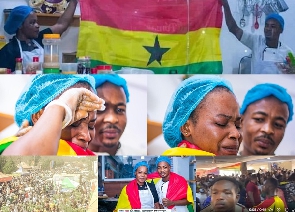From January 1, Ghana was left at a standstill when Ghanaian chef Failatu Abdul Razak embarked on a Guinness World record-breaking attempt
The recent Guinness World Record-breaking attempt organised by Ghanaian chef Failatu Abdul Razak in Tamale has provided both an economic and cultural boost to the northern city, according to an eyewitness account.
The 10-day event drew large crowds from across Ghana, with many travelling from the capital, Accra, and other parts of the country, even from overseas, to attend the event.
GhanaWeb sat with Eric Toscar, a blogger and entertainment critic who was present throughout the cook-a-thon for his observations the entertainment desk explored the impact of such a wide-scale event on the economy of the city, especially in its hospitality sector and the spotlight thrown on the creative arts sector in the country.
Hospitality
With hundreds of individuals pouring in from all parts of the world to Tamale, the massive influx filled up hotels, guest houses, and other temporary residential institutions. Rates of rooms per night increased to more than 100%.
“I was paying 200 cities a night and it was actually one of the cheapest. Modern city itself was charging 550 or 500. It wasn't less than 500.".
Transport
Local transport was not left out; taxis, tricycles, and motorcycle operators also benefited from the increased demand.
A popular means of transport, the tricycle, also known as “Yellow Yellow,” was charging between 10 and 20 Ghana cedis for a 20-minute ride—an upshot from the usual 5 cedis due to demand.
However, aside from the economic boost for the hospitality industry, the local creatives also got their time to shine, at least in the national spotlight.
Watching the livestream, one could see various musicians, comics, dancers, and creatives of various talents get a moment to perform for the crowd and the cameras.
“They actually have other stars there that we've not heard of down here. They have stars, and when they are performing, the crowd knows their lyrics word for word.”
“And they came continuously for like four days. Every day they come, they do a different craft. These guys are so popular in the Northern region that they can draw crowds of up to 10,000 spectators when they are hosting an event," he recalled.
So what does this mean?
The success of the GWR attempt demonstrates the excitement and demand for entertainment events throughout Ghana, not just centred in Accra.
However, poor investment and a lack of attention towards other parts of Ghana is a problem. Tamale is not used to hosting major events compared to Accra and initially struggled with planning and logistics. However, the city learned quickly and adapted as the festival went on.
“I observed that literally, they don't really experience major events over there. So the planning was quiet, there was some problem with the planning, but they got it right as the event went on. I think they were learning on the job. They were taking feedback from people who were there,” Eric observed.
This brings to light the problem of major events being centred only in Accra. This has led to a cyclical issue of economy-boosting events held in Accra due to the availability of resources.
“There's this school of thought that all the best things must happen in Accra. Like, if you do something and you want it to be proper, you must do it in Accra. When Fila announced that she wanted to do this. Some people are like, no, bring it to Accra. I understand that,” he said.
So what can be done?
Collaborations between Northern and Southern Ghanaian artists and influencers could help bring greater national attention to Tamale and the North.
This in turn can provide a spotlight to other parts of the country and the potential opportunities that investors may not particularly be privy to.
However, more investment is needed to properly host large-scale events and provide memorable experiences that will draw crowds.
“This current government started something that I really like - taking independent celebration outside Accra. Last year's independent celebration was in Tamale. It has happened in Cape Coast before. I think the Ashanti region also yeah. That kind of experience can also be part of our entertainment industry.
“All we need is the investment. Somebody might say up there, they won't buy tickets, they won't buy expensive tickets. Like, if you are pricing a ticket around 200 cedis or 300 cedis, you might not get 1000 people to buy it for you. You might not get it. But then if they are able to find a way to create internal revenue about the event and forget about ticket sales and try to create an experience,” said Toscar.
With the right investment and partnerships, Tamale and other regions stand ready to host major festivals, concerts, and celebrations that can boost their local economies.
ID/BB
Click here to follow the GhanaWeb Entertainment WhatsApp channel
Ghana’s leading digital news platform, GhanaWeb, in conjunction with the Korle-Bu Teaching Hospital, is embarking on an aggressive campaign which is geared towards ensuring that parliament passes comprehensive legislation to guide organ harvesting, organ donation, and organ transplantation in the country.
Entertainment of Thursday, 25 January 2024
Source: www.ghanaweb.com

















